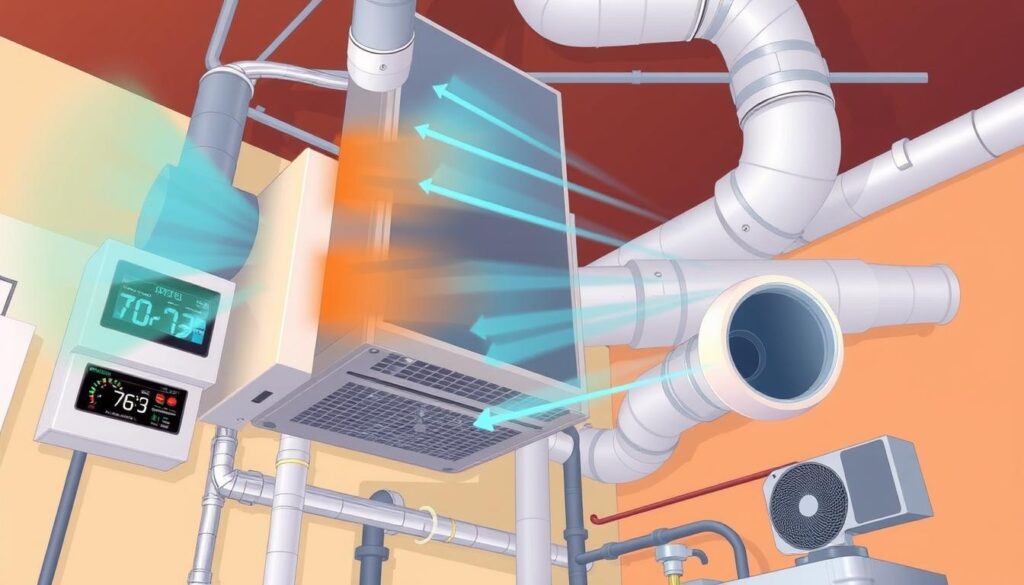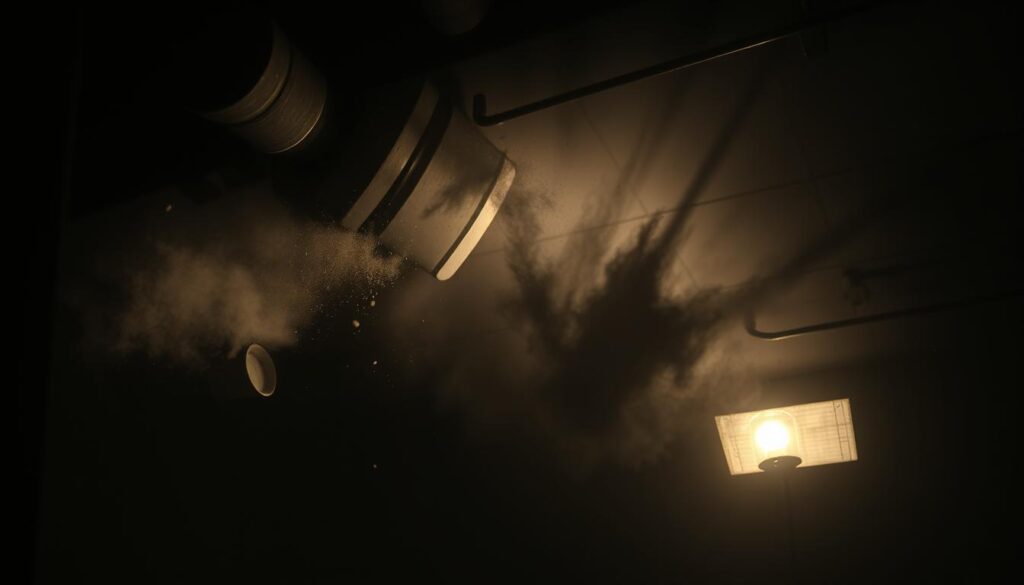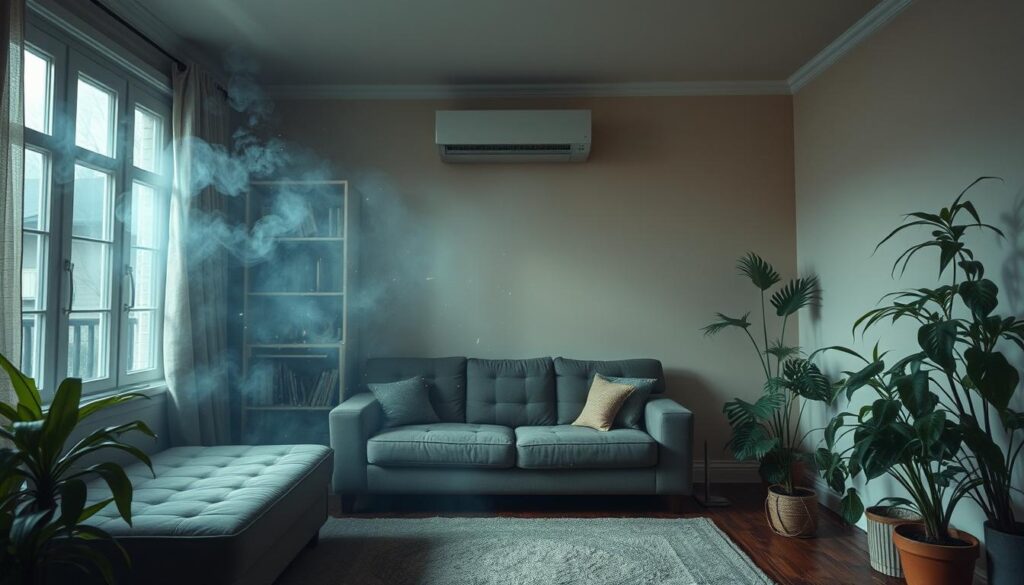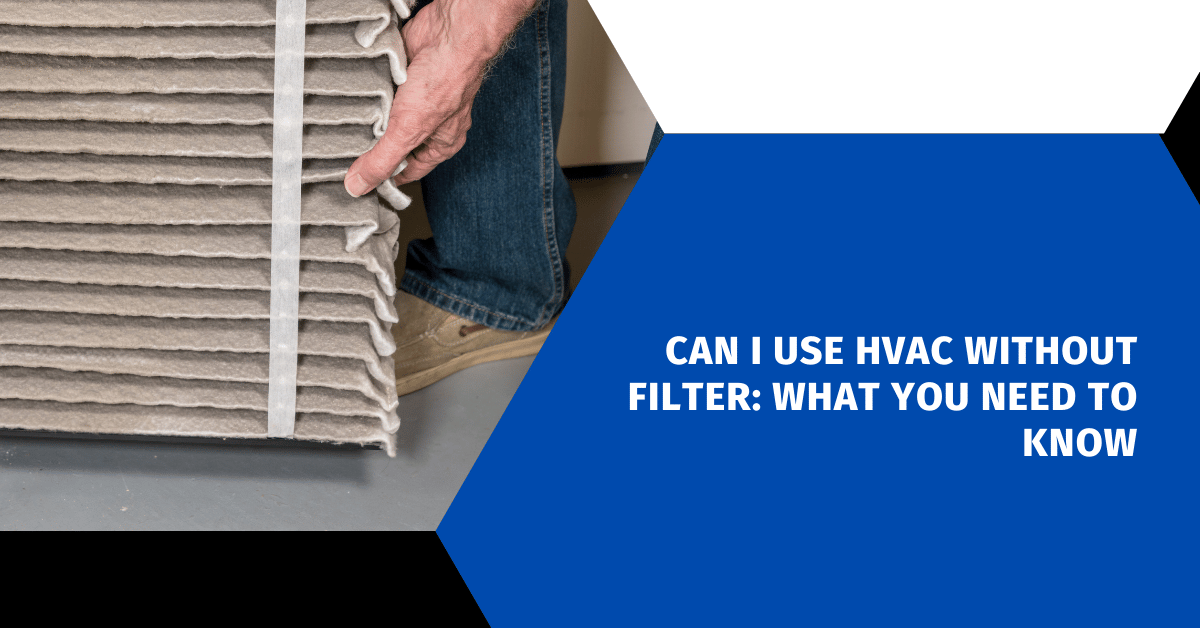Affiliate Disclosure
HVAC Guide Guys is a participant in the Amazon Services LLC Associates Program, an affiliate advertising program designed to provide a means for sites to earn advertising fees by advertising and linking to Amazon.
Can I Use HVAC Without Filter? Ever thought about running your HVAC without a filter? It might seem like a quick fix, but it’s not safe. We’ll dive into why filters are crucial and what happens if you skip them.

Key Takeaways
- Running an HVAC system without a filter for more than six hours can be risky and lead to various issues.
- Filters prevent dirt, debris, and other contaminants from entering the HVAC unit and being circulated throughout your indoor environment.
- Dirty or clogged filters can cause higher energy use, damage to critical system components, and poor indoor air quality.
- HVAC filters play a vital role in maintaining the efficiency and lifespan of your heating and cooling system.
- Neglecting filter maintenance can result in costly repairs and replacements down the line.
Table of Contents
Understanding HVAC Filters and Their Essential Role
HVAC filters are key to keeping your home’s air clean and your system running well. They catch dust, pollen, and other harmful particles. These filters are usually found in the return air duct or at the furnace’s front.
How Air Filters Protect Your HVAC System
By trapping these particles, filters keep your system clean. This helps it work better and last longer. It also saves you money on energy and repairs.
Types of Contaminants Filtered
HVAC filters catch a wide range of pollutants. They can filter out dust, pollen, and even some viruses. The filter’s MERV rating shows how well it can filter these particles.
Location of HVAC Filters in Your System
Filters are often in the return air duct or the furnace’s front. They catch contaminants before they circulate back into your home. This keeps the air clean and your system running smoothly.
It’s important to keep and replace your HVAC filters regularly. This ensures your air stays clean and your system works well for a long time.
Explore Our HVAC Shop
Looking for top-rated HVAC tools, parts, and accessories? Visit our shop and find the perfect solution for your needs.
Visit the ShopCan I Use HVAC Without Filter: The Short Answer
While an HVAC system can run without a filter, it’s not a good idea. Without a filter, the system can suffer from decreased comfort and damage. This can also lead to expensive repairs.
It’s best to wait for a new filter rather than running the system without one. This way, you avoid serious problems.
An AC should never go without a filter for more than 6-8 hours. Getting a tune-up from a trusted HVAC company like George Brazil Heating & Cooling in Phoenix since 1955 can help. This prevents the need to run an AC without a filter.
Running an AC without a filter makes it work harder. This increases energy use and can cause ice to form. It also damages important parts and lowers air quality.
The damage can be severe, even leading to a costly early replacement of the system. This can cost thousands of dollars.
Don’t run an air conditioner without a filter for more than 6-8 hours. This can damage the system and lower air quality. Getting a new filter from a preferred HVAC service is a good solution.
| Issue | Impact |
|---|---|
| Increased Energy Consumption | The system works harder to maintain temperature, leading to higher energy bills. |
| Damage to Critical Components | Debris can cause damage to the motor and compressor, leading to costly repairs or replacements. |
| Decreased Indoor Air Quality | The decline in air quality can expose individuals to respiratory irritants and health issues. |
| Potential System Failure | Running an HVAC system without a filter can lead to premature system replacement, costing thousands of dollars. |
In conclusion, using an HVAC system without a filter is not recommended. The risks to the system, air quality, and energy efficiency are too great. Always replace filters and maintain your HVAC system to keep it running well.
Explore Our HVAC Shop
Looking for top-rated HVAC tools, parts, and accessories? Visit our shop and find the perfect solution for your needs.
Visit the ShopThe Science Behind HVAC Filtration Systems
Air filtration is key to keeping your HVAC system running well. HVAC systems catch airborne particles as air moves through the filter. These filters are rated by how well they filter, using systems like MERV.
Air Flow and Filtration Process
As air moves through your HVAC, it goes through the air filter. This filter catches many contaminants. The filter’s material and design affect how well it catches different particles.
Higher-rated filters, like HEPA, catch even the smallest particles. This helps protect your HVAC system and improves the air inside.
Filter Materials and Construction
The materials and design of HVAC filters are very important. They use materials like pleated fabric and fiberglass. These filters trap pollutants like dust and pollen.
The filter’s design, like the number of pleats, affects how well it works. It also impacts airflow in your HVAC system.
| Filter Type | Filtration Efficiency | Typical MERV Rating | Ideal Applications |
|---|---|---|---|
| Fiberglass | Low to Medium | 4-8 | Basic filtration in residential HVAC systems |
| Pleated | Medium to High | 8-13 | Improved air quality in homes, offices, and healthcare facilities |
| HEPA | Extremely High | 17-20 | Superior air purification in hospitals, cleanrooms, and specialized applications |
Understanding HVAC filtration helps homeowners and professionals. It ensures your system works well, the air is clean, and energy is saved.
Immediate Risks of Running HVAC Without a Filter
Running your HVAC system without a filter can harm it and lower the air quality in your home or office. Without a filter, dust and other particles can get into the HVAC unit. This can cause HVAC damage, system contamination, and a decline in air quality.
These particles can stick to important parts like the blower fan and evaporator coils. This can lead to clogs, less airflow, and a drop in system efficiency. Over time, this can cause bigger problems, like system failures or breakdowns.
Without a filter, these contaminants keep circulating in your space. This can badly degrade the indoor air quality. It can be especially harmful for people with allergies, asthma, or other breathing problems.
| Filter Type | Benefits | Drawbacks |
|---|---|---|
| Fiberglass | Inexpensive | Require frequent replacement |
| Pleated | Longer lifespan than fiberglass | Slightly more expensive |
| Electrostatic | Washable or single-use options | May restrict airflow if not properly sized |
| HEPA | Capture 99.97% of particles down to 0.3 microns | Higher cost, professional installation recommended |
To keep your HVAC system working well and your indoor air clean, replace the air filter regularly. Follow the manufacturer’s advice on how often to do this.
Explore Our HVAC Shop
Looking for top-rated HVAC tools, parts, and accessories? Visit our shop and find the perfect solution for your needs.
Visit the ShopLong-Term Consequences for Your HVAC System
Ignoring your HVAC system’s air filter can cause big problems. Dirt and debris can damage important parts like the evaporator coils and motors. This can shorten your HVAC longevity and increase repair costs later on.
Impact on System Components
Without a filter, harmful particles can harm your HVAC’s sensitive parts. This is especially bad for the compressor, a key part of your cooling system. Unfiltered air makes the compressor work too hard, leading to early failure and expensive repairs.
Reduced System Lifespan
Not using a filter can make your HVAC system last much less time. Experts say filters should be changed every 3 months for best system efficiency. Skipping this can make your system wear out 50% faster or more.
Maintenance Cost Implications
Ignoring your HVAC’s filter can lead to more than just system replacement costs. It can also mean more frequent and pricey maintenance. Cleaning coils, fixing motors, and replacing compressors can quickly become expensive. This can really hurt your budget.
“Failure to change the air filter can result in significant consequences, including serious compressor damage.”
Effects on Indoor Air Quality
Running your HVAC system without a filter can harm the air quality in your home. Air filters catch dust, pollen, pet dander, and allergens. Without them, your HVAC system spreads these pollutants, lowering air quality.
Poor air quality can hurt your breathing right away and over time. It can irritate your eyes and skin. It can also make asthma and allergies worse. Studies show indoor air can be dirtier than outside air, making filters key for a healthy home.
| Key Factors | Effects |
|---|---|
| Allergen Circulation | Increased exposure to pet dander, pollen, and other allergens, leading to more frequent and severe allergy symptoms. |
| Respiratory Health | Worsening of asthma and other respiratory conditions due to the recirculation of airborne irritants. |
| Dry Air | Dry, cold air from the HVAC system can lead to dry skin, eyes, and nasal passages, increasing susceptibility to illness. |
To keep your air clean and protect your family, use a good HVAC filter. Choose one with a high MERV rating. This will catch more pollutants and allergens, keeping your home air fresh.

Explore Our HVAC Shop
Looking for top-rated HVAC tools, parts, and accessories? Visit our shop and find the perfect solution for your needs.
Visit the ShopEnergy Efficiency and Operating Costs
Not changing your HVAC system’s air filter can really hurt its energy efficiency and your bills. A dirty filter makes your HVAC work harder to keep your home at the right temperature. This means it uses more power.
The Department of Energy says a dirty filter can make your furnace or air conditioner use up to 15% more energy. This can make your monthly utility costs go up.
A dirty filter also means your home might not be evenly heated or cooled. This makes your HVAC system work even harder. It can lead to more breakdowns and expensive repairs.
Power Consumption Changes
When your air filter gets too dirty, your HVAC system has to work harder. This means it uses more power. Your energy bills will go up, and your HVAC might break down more often.
Monthly Bill Impacts
A dirty air filter can really raise your monthly energy bills. It’s important to keep your filter clean. This helps your HVAC system run more efficiently and saves you money.
| Filter Type | Filtration Efficiency | Typical Cost | Replacement Frequency |
|---|---|---|---|
| Fiberglass | Basic, captures larger particles | $1-$4 per filter | Every 90 days |
| Pleated | Advanced, traps finer particles | $5-$20 per filter | Every 90 days |
| Electrostatic | Uses static electricity to attract particles | $10-$50 per filter | Every 6-12 months |
| HEPA | Exceptional efficiency, filters out even small particles | $20-$100 per filter | Every 6-12 months |
Damage to Critical HVAC Components
Running your HVAC system without a filter is risky. It can damage the compressor, which is key for moving refrigerant. Without a filter, debris can harm it. Also, the evaporator coils, which absorb heat, can get dirty. This makes them less efficient and might cause freezing problems.
Issues with the compressor and evaporator coils can lead to system failures. These failures might need expensive repairs or even a new system. Not using a filter can harm your HVAC’s performance and shorten its life. It’s important to use a filter to protect your investment and keep your HVAC working well.
| HVAC Component | Risks of Running Without a Filter |
|---|---|
| Compressor | Debris and contaminants can damage the compressor, which pumps refrigerant through the system. |
| Evaporator Coils | Grime buildup on the coils reduces their ability to absorb heat, potentially leading to freezing issues. |
Keeping your HVAC filter clean is key to your system’s health and life. Ignoring this can lead to expensive fixes or even a complete system failure. So, it’s crucial to keep up with your filter maintenance.
Health Implications for Household Members
Not using an HVAC filter can harm your family’s health. Unfiltered air brings in allergens, dust, and harmful particles. This can cause allergies, make breathing problems worse, and lead to other health issues. It’s especially risky for kids, the elderly, and people with health problems.
Filters are key in keeping the air clean by removing pollutants. Without them, these pollutants can make breathing hard, especially for those with asthma or bronchitis. Allergens like pollen and pet dander can also make allergies worse, causing sneezing and itchy eyes.
Bad indoor air quality can harm your health over time, especially for those who are more vulnerable. Long-term exposure to pollutants can raise the risk of heart disease and lung cancer. Even toxic substances like carbon monoxide from HVAC leaks can be dangerous, causing serious health problems.
To keep your family healthy, it’s important to have a working HVAC system with a good filter. Choose high-quality filters with a high MERV rating to catch more particles. Regular HVAC maintenance and duct cleaning can also improve air quality and reduce health risks.

By focusing on HVAC filter care and air quality, you can make your home healthier. Taking care of your HVAC system can greatly improve your family’s breathing and overall health.
Emergency Solutions When Filter Replacement is Delayed
It’s key to replace your HVAC system’s air filter regularly. But sometimes, you might not have a new filter right away. In these cases, knowing how to keep your temporary filtration going is crucial to avoid system protection problems.
Temporary Measures
If you can’t get a new filter, it’s better to use a dirty one than none at all. You can even make a quick filter with cheesecloth or a clean cloth. These fixes won’t replace a real filter, but they help protect your system a bit.
When to Shut Down Your System
If you can’t find any filter, even a temporary one, it’s best to turn off your HVAC. Running it without a filter can harm important parts. This could damage your system and hurt its system protection in the long run.
Knowing how to handle air filtration issues helps keep your HVAC system running well. Even when you can’t get a new filter right away.
Explore Our HVAC Shop
Looking for top-rated HVAC tools, parts, and accessories? Visit our shop and find the perfect solution for your needs.
Visit the ShopProper Filter Maintenance Schedule
Keeping your HVAC system’s air filters clean is key for top performance. Most homes should change their air filters every two to three months. This can change if you have pets or use your system a lot.
Regular HVAC upkeep includes changing filters, oiling parts, cleaning inside, checking wires, and adjusting coolant. Sticking to a filter maintenance plan brings many benefits. You’ll see better system efficiency, longer equipment life, lower energy use, and lower bills. Plus, you’ll get cleaner air and avoid expensive repairs.
The MERV rating for HVAC filters goes from one to 20. Fiberglass filters are usually one to five, and pleated ones are five to 10. For the best results, use filters with a MERV rating of 8 or higher. These filters catch smaller particles and improve air quality.
| Filter Type | MERV Rating | Filtration Capability |
|---|---|---|
| Fiberglass | 1-5 | Captures large particles |
| Pleated | 5-10 | Captures smaller particles |
| HEPA | 16+ | Captures ultra-fine particles |
Reusable air filters, like those from cotton or polyester, need cleaning every three months. The cleaning method depends on the filter. Not changing or cleaning filters can make your HVAC less efficient, use more energy, and even break down.
Following a good filter replacement schedule and using quality HVAC maintenance services keeps your system running well. This means better air quality and energy savings for you.
Conclusion
Running your HVAC system without a filter is risky. It can harm the system’s performance and lifespan. It also affects the air quality in your home. Regular HVAC care, like replacing filters, is key. It keeps your system running well and the air clean.
Ignoring filter changes can lead to big problems. Your system might use more energy, raising your bills. It could also damage important parts and let harmful particles into your home. Keeping filters clean is a small step that pays off big in system performance and air quality.
As an HVAC owner, changing filters regularly is crucial. It protects your investment and keeps your family healthy and comfortable. By taking care of your HVAC, you ensure it works well for years. This also keeps the air in your home clean and healthy.

